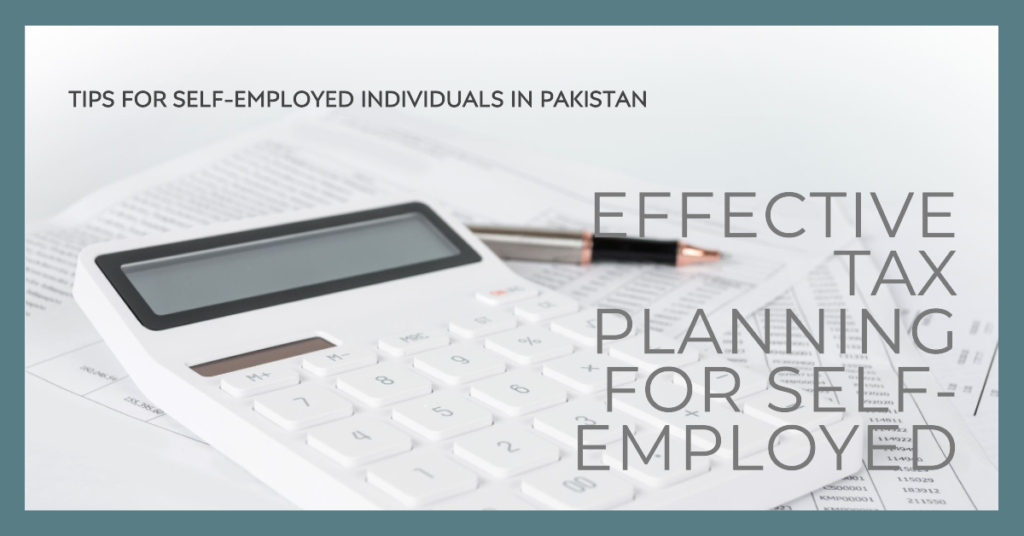Introduction:
Tax planning is a vital aspect of financial management for self-employed individuals in Pakistan. With proper tax planning strategies, self-employed individuals can optimize their tax liabilities, maximize deductions, and ensure compliance with tax laws. This article aims to provide detailed tips for effective tax planning specifically tailored to self-employed individuals in Pakistan. It includes an introduction, definitions, examples, case studies, and a concluding remark.
Definitions:
Tax Planning: Tax planning is the process of organizing financial activities and utilizing legal methods to minimize tax liabilities while maximizing tax benefits and compliance with tax laws.
Self-Employed Individuals: Self-employed individuals are individuals who work for themselves and do not have an employer-employee relationship. They are typically freelancers, independent contractors, consultants, or sole proprietors.
Tips for Effective Tax Planning for Self-Employed Individuals in Pakistan:
Maintain Accurate Records: Keep thorough and accurate records of income, expenses, and receipts related to your self-employment activities. Maintaining organized records ensures you have the necessary documentation to support your tax deductions and provides clarity during the tax filing process.
Separate Business and Personal Expenses: Maintain a clear distinction between business and personal expenses. Use separate bank accounts and credit cards for business transactions to facilitate accurate tracking and to simplify tax reporting.
Understand Tax Deductions and Exemptions: Familiarize yourself with tax deductions and exemptions available for self-employed individuals in Pakistan. This includes deductions for business expenses such as office rent, equipment, utilities, professional fees, marketing expenses, and travel. Understanding these deductions allows you to maximize your tax savings.
Keep Track of Tax Deadlines: Stay informed about tax deadlines and ensure you file your tax returns on time. Late filings may result in penalties and additional charges, impacting your overall tax liability.
Consider Tax-Advantaged Retirement Plans: Explore tax-advantaged retirement plans, such as Individual Retirement Accounts (IRAs) and Voluntary Pension Schemes (VPS). Contributing to these retirement plans can help reduce your taxable income while simultaneously planning for your future financial security.
Consult with a Tax Professional: Consider consulting with a tax professional or accountant who specializes in self-employment taxes. They can provide personalized advice, identify potential tax-saving opportunities, and help ensure compliance with tax regulations.
Examples:
Deductible Business Expenses: A self-employed graphic designer in Pakistan can deduct expenses such as computer software, design tools, office supplies, internet expenses, and professional development courses as legitimate business expenses. By keeping detailed records and understanding the eligible deductions, the graphic designer can reduce their taxable income.
Retirement Contributions: A self-employed consultant in Pakistan can contribute a portion of their earnings to a Voluntary Pension Scheme (VPS) approved by the Federal Board of Revenue (FBR). By making regular contributions, they not only plan for retirement but also benefit from immediate tax deductions on the contributions made.
Case Studies:
Mr. Ali’s Tax Planning: Mr. Ali, a self-employed photographer, sought professional tax advice in Pakistan. Through effective tax planning, he learned about specific deductions available to photographers, such as camera equipment depreciation, studio rent, and insurance premiums. By maximizing these deductions, he significantly reduced his taxable income and overall tax liability.
Ms. Fatima’s Retirement Planning: As a self-employed freelancer, Ms. Fatima incorporated tax-advantaged retirement planning into her financial strategy. With the guidance of a tax professional, she established an Individual Retirement Account (IRA) and contributed a portion of her earnings annually. This not only helped her reduce her current taxable income but also ensured she was planning for a secure retirement.
Conclusion:
Effective tax planning is essential for self-employed individuals in Pakistan to optimize their tax liabilities, maximize deductions, and ensure compliance with tax laws. By maintaining accurate records, separating business and personal expenses, understanding tax deductions and exemptions, meeting tax deadlines, considering retirement plans, and seeking professional advice when necessary, self-employed individuals can effectively plan and manage their taxes. The examples and case studies illustrate the positive outcomes of strategic tax planning. By prioritizing tax planning, self-employed individuals in Pakistan can achieve greater financial stability, maximize tax savings, and focus on growing their businesses.
